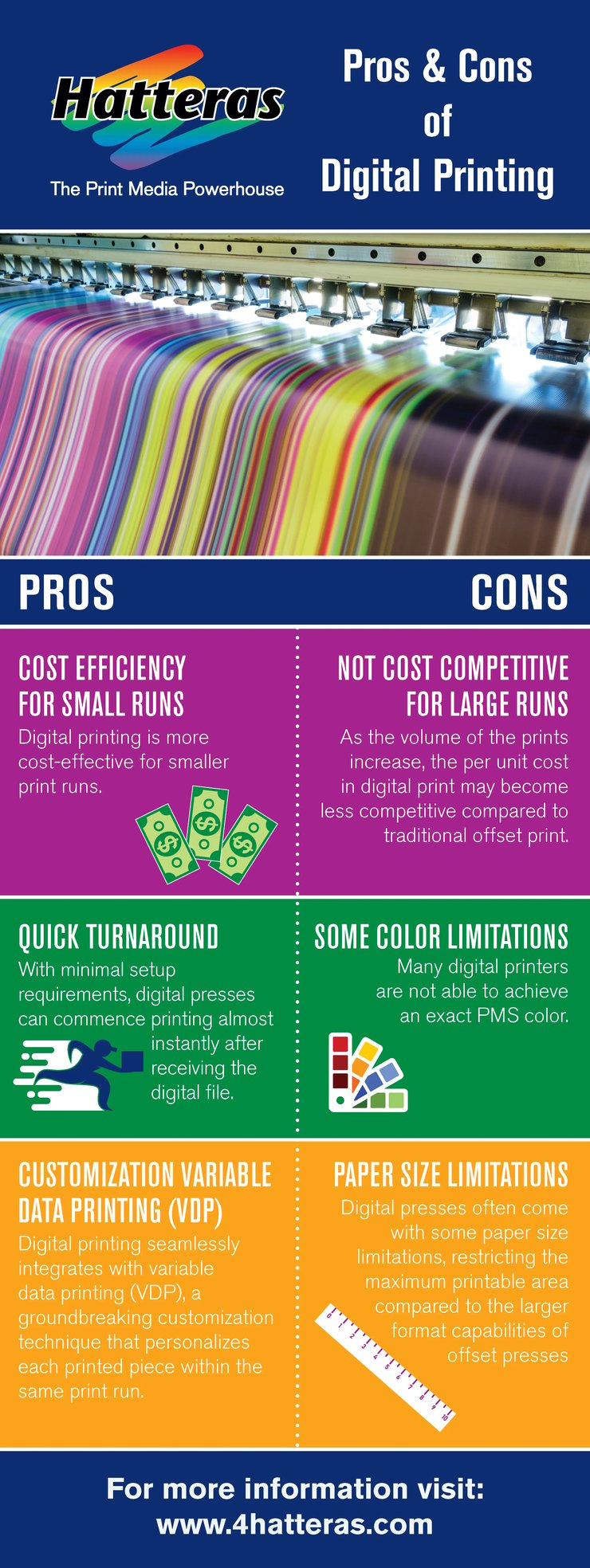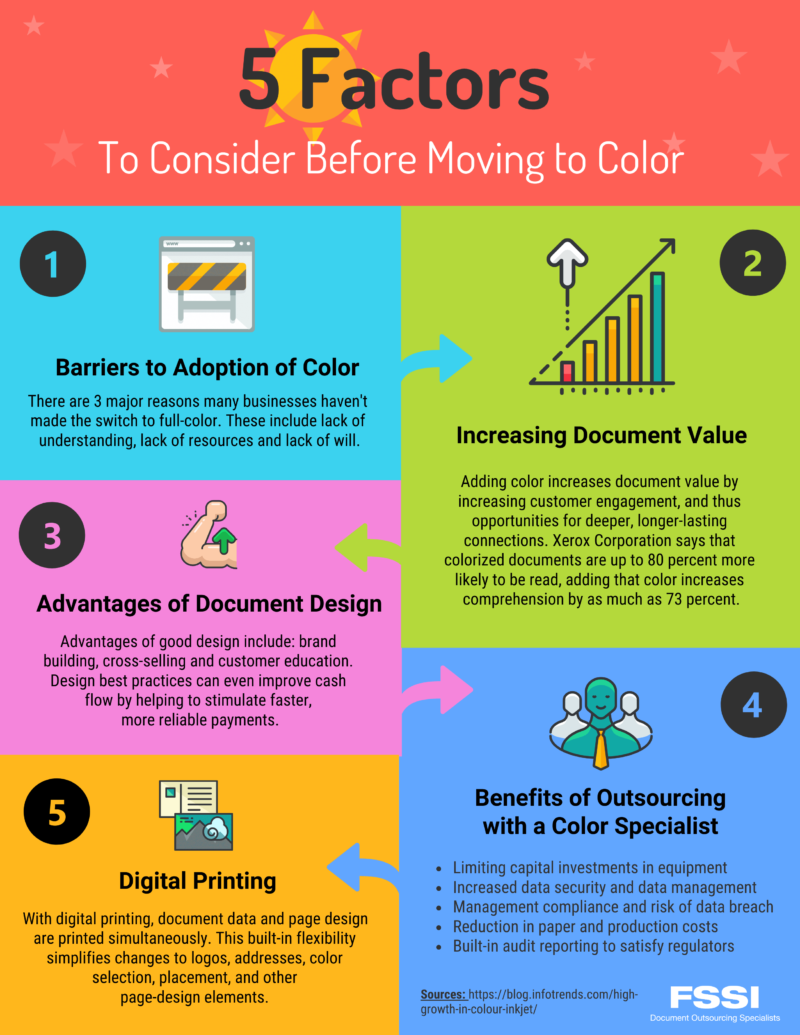Facts About Digital Printing Revealed
Facts About Digital Printing Revealed
Blog Article
The Buzz on Digital Printing
Table of ContentsExamine This Report about Digital PrintingSee This Report on Digital PrintingWhat Does Digital Printing Mean?What Does Digital Printing Mean?The Best Strategy To Use For Digital PrintingExamine This Report on Digital Printing
has the advantage of only publishing what you need. Balanced out printing's high arrangement costs prevent it from being economical for runs of 100, 10, and even a solitary copy. A tailored message is always well obtained by customers. Digital printing allows for straightforward personalization of advertising materials. Smaller sized, more cost-effective batches let firms customize each order. Have a sale for the return to college. Alternatively, you can individualize your e-newsletters for repeat consumers by resolving them by name. Variable data printing, such as direct-mail advertising with individualized codes and addresses, is preferably fit for electronic printing. Making adjustments to your design in the nick of time is much simpler with digital printing. It assists in. And this printing technique warranties precision, so designs will always look the same. Choices for paper supply, surfaces, and other attributes will remain to grow as modern technology developments. When it concerns printing, Seattle Layout and Publish is among the most trusted companies around. Digital quick printing just needs four actions of layout, testimonial, printing and binding to get whatever done. Conventional printing covers a huge location and needs a huge financial investment in technology. The investment of up to 10sof millions of yuan has made some tiny and average financiers inhibited and helpless. The core of Digital Express is software application. As long as the software application updates can maintain up, Digital Express will certainly constantly be at the leading edge of the printing market. And a collection of software of numerous thousand yuan is as well tiny compared to a set of tools of a number of
million yuan. One or 2 people, a dozen square meters of store front, can open up an electronic specific printing shop. Digital fast printing has an unparalleled advantage: print as needed - Digital Printing. The contemporary organization design is adaptable and versatile, and it is reflected in the printed issue. It
is most likely that today's demands are different from yesterday.
According to PMMI, digital printing permits brands and producers to react promptly to consumer demands while boosting the supply chain, lowering warehousing expense and waste, and enjoying faster time to market. That all sounds wonderful, but exactly how does this technology do all that? The significant differentiator of these modern technologies is that there are no set-up costs and no plates with digital printing.
Excitement About Digital Printing
According to Wikipedia, the best difference in between electronic printing and conventional methods such as lithography, flexography, gravure, or letterpress - Digital Printing is that there is no demand to change printing plates in digital printing, whereas in these analog printing approaches the plates are repeatedly changed. This results in quicker turn-around time and lowers expense when using electronic printing.
Speedy manufacturing suggests obtaining your item to market quicker. It likewise indicates it's easier and faster to make modifications in the future, when you alter a recipe, include a SKU, or produce seasonal packaging. Digital printing is very flexible, so it's very easy to make adjustments to the package read style promptly. It all goes back to home plates.
A lot more inventory can suggest more waste in the future. With traditional printing approaches, short-run printing published here is simply not possible. Since a fantastic design can make or break your product, digital printing constantly develops high-grade, clear and vibrant graphics each time. Digital printing on adaptable pouches adds the intense, lively, and exact graphics that practically beckon customers to reach out and touch them.
Digital printing is the procedure of printing digital-based photos directly onto a variety of media substrates. There is no requirement for a printing plate, unlike with countered printing. Digital data such as PDFs or desktop computer posting data can be sent out straight to the digital printing press to print theoretically, image paper, canvas, fabric, synthetics, cardstock and other substratums.
Everything about Digital Printing
According to PMMI, digital printing allows brand names and producers to react swiftly to customer needs while improving the supply chain, minimizing warehousing price and waste, and appreciating faster time to market. That all noises terrific, but exactly how does this innovation do all that? The major differentiator of these modern technologies is that there are no set-up fees and no plates with digital printing.
According to Wikipedia, the best difference in between digital printing and typical techniques such as lithography, flexography, gravure, or letterpress is that there is no need to change printing plates in digital printing, whereas in these analog printing methods home plates are continuously replaced. This causes quicker turnaround time and lowers price when using electronic printing.

Digital Printing Fundamentals Explained
With standard printing techniques, short-run printing is just not possible. Due to the fact that a wonderful layout can make or damage your item, digital printing continually creates high-grade, clear and colorful graphics each time.

According to PMMI, electronic printing allows brand names and manufacturers to respond quickly to customer needs while boosting the supply chain, minimizing warehousing expense and waste, and taking pleasure in faster check time to market. That all audios fantastic, yet exactly how does this technology do all that? The major differentiator of these modern technologies is that there are no set up fees and no plates with digital printing.
The Only Guide to Digital Printing
According to Wikipedia, the biggest difference between digital printing and standard techniques such as lithography, flexography, gravure, or letterpress is that there is no need to change printing plates in electronic printing, whereas in these analog printing approaches home plates are consistently changed. This causes quicker turn-around time and decreases expense when using electronic printing.
Rapid production means getting your item to market faster. It also means it's simpler and faster to make changes in the future, when you change a recipe, add a SKU, or create seasonal packaging. Digital printing is extremely flexible, so it's very easy to make changes to the package design quickly. Everything goes back to home plates.

The smart Trick of Digital Printing That Nobody is Discussing
Digital printing is the procedure of printing digital-based images straight onto a variety of media substratums. There is no requirement for a printing plate, unlike with balanced out printing. Digital data such as PDFs or desktop posting data can be sent directly to the electronic printing machine to print on paper, picture paper, canvas, textile, synthetics, cardstock and various other substratums.
Report this page